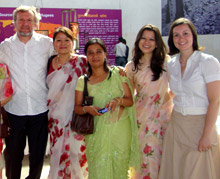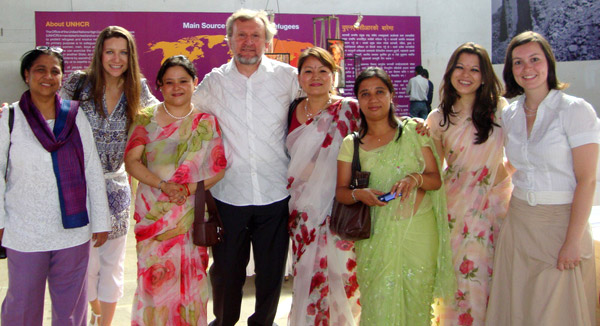United Nations High Commissioner for Refugees (UNHCR), Kathmandu, Nepal

Erin Hallock pictured with colleagues from UNHCR at a Photo Exhibition marking World Refugee Day in Kathmandu, Nepal |
My International Human Rights Internship has allowed me to take the natural step from the practice of national to international refugee law and, at the same time, to take a giant leap half-way around the world from Toronto to Kathmandu. I am spending my summer working with the United Nations High Commissioner for Refugees (UNHCR) in Nepal where complex political realities and substantial populations of refugees have made for a unique internship experience.
To give a sense of the setting for my internship, the Government of Nepal has not signed the 1951 Refugee Convention, and as such it has no domestic refugee legislation to guarantee the right of asylum to people fleeing persecution in their countries of origin. Despite this, however, a large number of refugees currently reside in Nepal and they fall into three distinct groups of concern to UNHCR. The first group is comprised of more than 100,000 refugees who fled Bhutan in the early 1990s and have resided since that time in refugee camps in eastern Nepal. The second group is made up of people arriving from Tibet, including the approximately 2,500 whose transit to India is facilitated every year. Finally, the third group is the most diverse, and includes about 300 urban refugees living in Kathmandu from a variety of countries, such as Pakistan, Somalia and Myanmar, among others. The protection space that UNHCR is able to provide for these groups varies greatly depending on the prevailing political climate in Nepal and throughout the geo-political region.
As an intern this summer, I have had the opportunity to engage in all areas of UNHCR's work, though my focus has been on the urban refugee population. I have conducted legal research and prepared memoranda in support of refugee status determination in complex cases, and I have helped to assess and develop programs to meet the needs of the refugees living in Kathmandu. I have also been able to share my knowledge and experience in the Canadian legal system with my UNHCR colleagues, as we have discussed and debated the ubiquitous challenges of assessing the credibility of asylum seekers and striking the appropriate balance between protecting individual versus collective rights. Overall, it has been both a demanding and rewarding experience.
Some of the most meaningful moments for me during my internship involved the commemoration of World Refugee Day on June 20. UNHCR hosted a larger-than-life photo exhibit in Kathmandu highlighting the plight of refugees around the world and I was encouraged by the engagement of the Nepali public in the event. In addition, Kathmandu's urban refugees were brought together to share with UNHCR and each other aspects of their cultural identities, including through food, music and a football match. Throughout these events and the rest of my internship, I have come to understand the integral role that UNHCR plays in both the context of international refugee protection and the lives of individuals all over the world. It has truly been an honour to be a part of it and I am grateful to have had such an opportunity.



